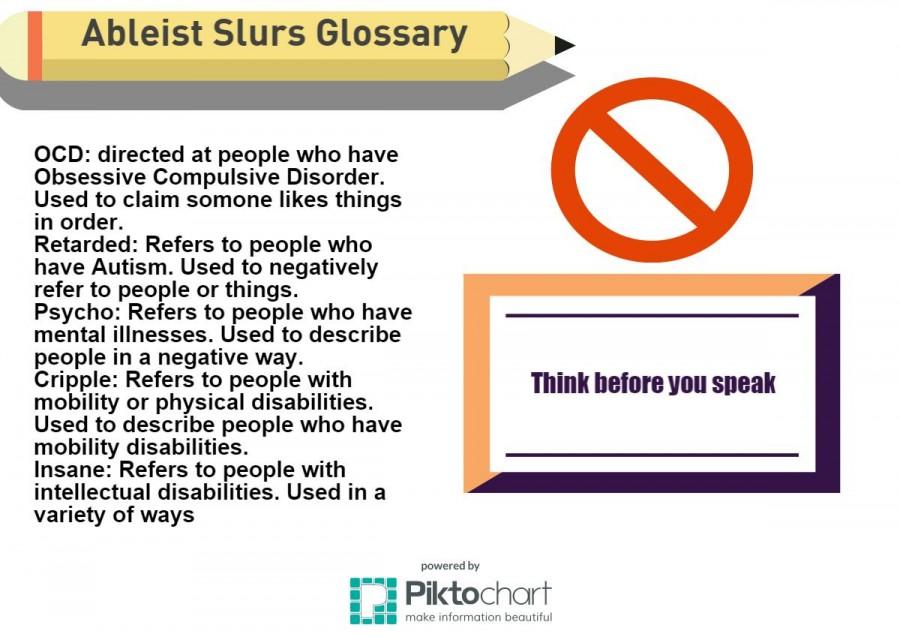Ableist language harms South High’s community
September 25, 2015
According to a popular blog called Forward, feminists with disabilities for a way forward, ableism is defined as a form of discrimination against people who have disabilities and mental illnesses. We have all heard those ableist slurs in everyday terms, whether the intention is to describe a person or thing, there is no denying how ingrained these words are in casual phrases and how they get used at South.
“I have an insane amount of homework tonight,” or, “ I got number eight wrong on the homework, I am so stupid.” Both are common sentences used by students when describing their lack of knowledge on a subject or the magnitude of their assignments. How much do these students really know about the power of the language they use and how it affects students who have disabilities at South?
“Dumb, crazy, insane, stupid, idiot, lame, mad, psycho, slow,etc,” are all examples of slurs one should avoid when using common language. What one could say instead of using an ableist slur is, “ I am super busy with homework tonight,” instead of, “I have a crazy amount of homework to do tonight.” When making an effort to use other terms in place of ableism, it is necessary not just to replace the problematic language with synonyms but to change the meaning of what you are trying to say otherwise, the sentiment of the sentence remains ableist.
Special Education teacher Emily Andrews says that she hears slurs used frequently in common language hundreds of times a day and, when speaking of her students, she goes on to say, “They like for the classroom door to be shut.”
She also mentions how her students may try to dissociate themselves with the Special Education program. “They like to associate with other programs, they’ll say that they’re in a different program over the program that they are actually in or they’re dually enrolled.”
She goes on to mention how telling someone that they are a part of the Special Education program can put a target for bullying on their backs.
Using these slurs can create even more stigmas around disabilities and create an unsafe space at South for those students. Especially because people are convinced that no one will speak out about ableism, it makes it easier to sweep the matter under the rug.
Andrews goes on to say, “I think it’s an easy realm for students who don’t have an understanding [of disabilities] to use it as ammo to bully.” If these words are so harmful to students who have disabilities, and can be used as an excuse to bully, why are these words and phrases so commonly accepted in casual sayings? Why are they more acceptable to students than other slurs?
It’s likely that not many students are aware of what ableism is and how it impacts people around them on a daily basis. Some students who have disabilities may not be comfortable asking other students around them to stop using such harmful language. That’s not exactly the case with senior Ahmed Ali.
When speaking with Ali, he mentioned that sometimes he is uncomfortable asking students to change their language, but his confidence in requesting appropriate vocabulary around him has increased as he has gotten older. He goes on to mention that when he hears student’s casually use these terms around him, he feels sad and angry.
He also says that he wishes that the Special Education program at South was bigger, but he feels that he receives the help he needs at South. Ali also touches on the idea that staff members who don’t work in the Special Education program are not as aware of ableism. He feels newer teachers who aren’t familiar with the way South operates sometimes use ableist language when talking with students.
Are staff members who work in the Special Education program more conscious of ableism than staff members who work in other programs? From what I have experienced as a student, I hear ableism slip from staff members mouths quite frequently, which is understandable considering how normalized it is in speech, but a stronger effort can be put forth by staff members as well as students.
Andrews feels that staff make more of a conscious effort to eliminate ableism from their vocabularies and that staff don’t use ableism as much as students. This may be true for staff members who work with students who have disabilities, but the statement cannot be applied to all teachers.
Ask yourself when having everyday conversations, how can I phrase this differently? If you don’t speak out about ableism, or try to stop ableist microaggressions who will? Are you doing your best to make South a safe space for students who have disabilities? Are you advocating for them? Or will you too sweep the issue under the rug because you don’t feel it affects you? The bottom line is, we can all be doing more to better the South High community and begin to take steps in eliminating ableist vocabulary from everyday language.






Cristina • Mar 15, 2018 at 9:16 am
Regarding the image provided with this article, the word retarded does NOT refer to autistic individuals, or at least not all. My form of autism grants me with a higher IQ than most, yet awful social skills. Please do not make people believe it is alright to call someone with my condition retarded. Thank you
-Aspie
Sarah Genosky • Sep 28, 2015 at 1:58 pm
Thanks for the article, Noura. It’s a good reminder to think about the language we use everyday before it spills out of our mouth.